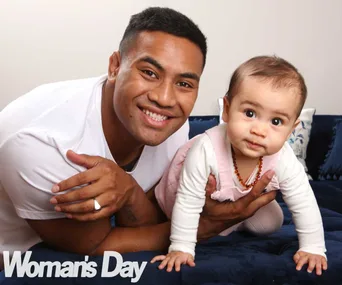“I was brought up in a very sporting family. Mum and Dad used to drag us off to rugby games and cricket matches. I was born in Johannesburg but grew up in Durban, which is where my rugby journey really began in the early 1990s.
My first role in rugby as a marketing and public relations manager saw me focus on attracting women and families to the game. In those days, matches were only on about once a month, but when they were held, it was the biggest party in Durban.
We worked really hard on serving healthy food, boosting security and making sure the bathrooms were kept very clean. And, of course, the matches were held in the afternoon. Everyone would park on the eight rugby fields surrounding the stadium, put little marquees up and barbecue out of their car boots. It was just so much fun!
However, politically it was very chaotic in the early ’90s in South Africa. I can’t begin to explain what it was like living through that. But sport played a positive role, and then came the election in 1994. I’ll never forget voting that day, the first day that every South African could vote. You can’t imagine the joy!

Lisa with Neslon Madela
Many of the big milestones in my life seem to be measured by the world cups.
The 1995 Rugby World Cup in South Africa was phenomenal. Everyone always asks, ‘Was there poison?’ And to this day, I believe there was.
After that tournament, I worked for South Africa Rugby. But everything changed for me in 1999 when the All Blacks came to play the Springboks. We always used to do a big welcome at the airport for visiting teams and the New Zealand High Commissioner sent his offsider to help, and that’s how I met my partner.
The following year, he proposed and I followed him to New Zealand. The 2003 Rugby World Cup is when we adopted our daughter, which was amazing times ten! And then I got to work on the Rugby World Cup as a VIP Manager with Rugby New Zealand in 2011.
I’m always asked, Who do I support? And my answer is, ‘My blood is green, my heart is black. I’m blessed to love both countries and teams.’

When the 2011 Rugby World Cup finished, I didn’t think I was ever going to love anything as much, but this job at the New Zealand Rugby Foundation has been even better. The foundation started in 1986 with a vision to help rugby areas in need. But it started to become apparent that there were guys out there in wheelchairs from rugby injuries whose lives had instantly changed, and nothing was being done for them. Now, our core purpose is to partner with those we call our VIPs – Very Injured Players.
We are a community here because when a player is injured, it impacts their entire family. There are 155,000 registered rugby players in New Zealand. About 400 are professional and we look after the rest. So this means that any player aged five to 64 is insured.
One of our VIPs was the first in the world to graduate as a physiotherapist while being in a wheelchair, and we’ve got about four VIPs doing PhDs at the moment. Sporting-wise they go on to do canoeing and cycling, and of course, wheelchair rugby. You’d think these guys would hate the code after having traumatic injuries from the game, but they just all remain real rugby heads.

Lisa with Toia Laufili, who suffered a severe spinal injury playing rugby in 2015, and his parents.
The advocacy work we do on behalf of our guys is growing. It’s really important as some of our players were just 15 when they were injured.
When a bad injury happens, we get a phone call pretty quickly and the rugby network kicks in.
In 2016, there were 187 new spinal cord injuries in the country and two of them were from rugby. The numbers are going down and we really believe the New Zealand Rugby and ACC Rugby Smart safety messages are getting through. Sadly, it doesn’t matter how safe we make the game, accidents do happen.
What’s so rewarding about this role is we are there for people and helping to network families who are going through the same thing.”

The NZ Rugby Stars Cookbook showcases fabulous recipes from rugby superstars all in the name of raising money to support catastrophically injured rugby players and their families through the New Zealand Rugby Foundation. You can purchase online or in all good book stores from October 1.



